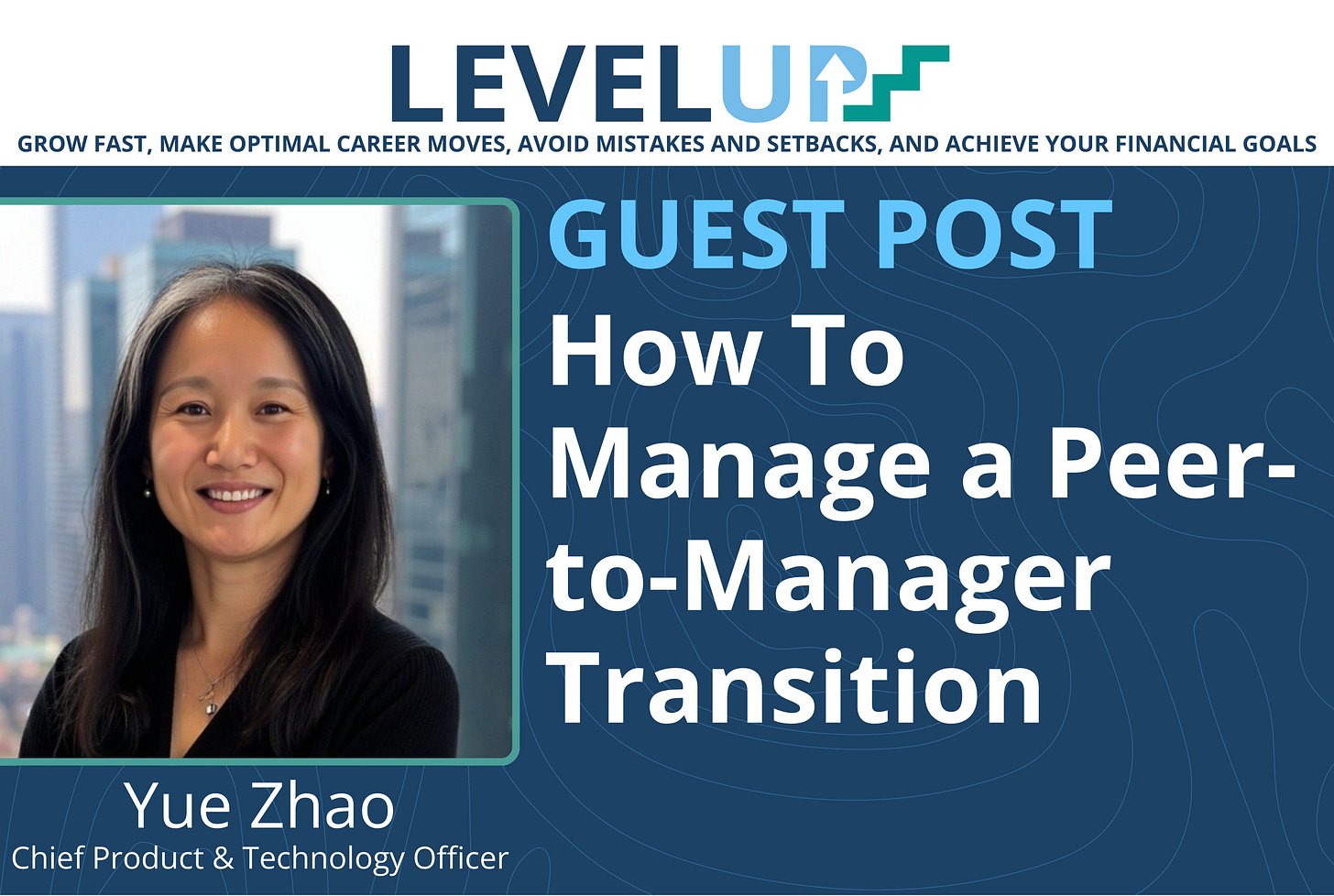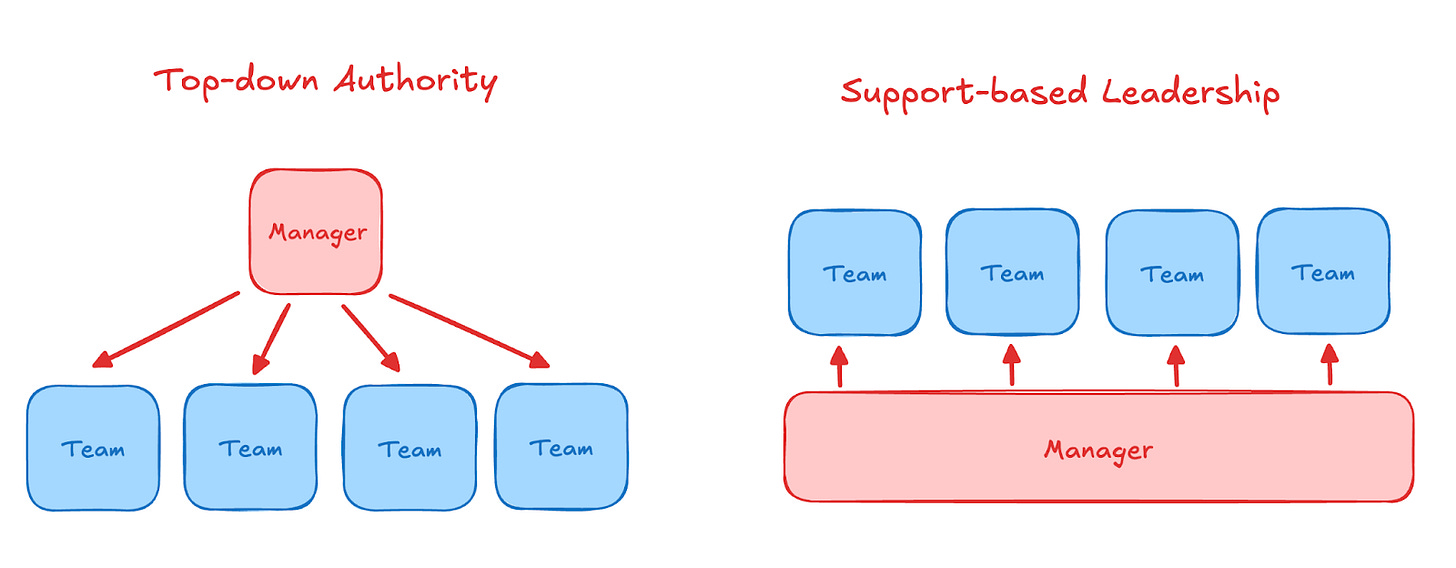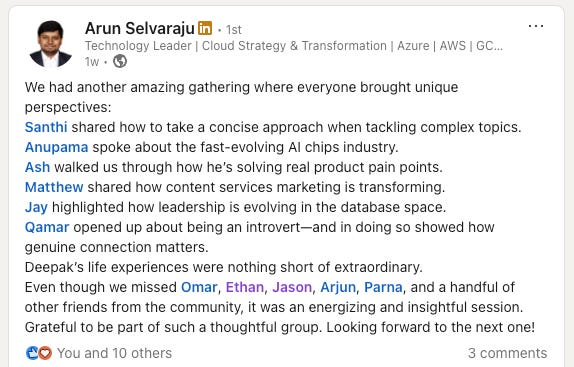How To Manage a Peer-to-Manager Transition
Why support (not authority) is the key to thriving when leading former peers
Hello, it’s Ethan & Jason. Welcome to Level Up: Your guide to grow fast, avoid mistakes, and make optimal career moves.
2 upcoming events:
(Sept 17) Lead AI Adoption as a Change Agent. Learn how top leaders are driving AI transformation beyond traditional management. RSVP here.
(Sept 22) Reorgs are the new promotion. With slow hiring and layoffs, learn how to position yourself to be chosen and be setup for growth. RSVP here.
We’re thrilled to feature another guest post by Yue Zhao, an executive coach for women and minority leaders who want to accelerate their careers and reach the C-suite. She is a CPO & CTO in Silicon Valley with 15+ years of leadership experience across Meta, Thumbtack, and McKinsey. Yue is also a published author and teaches a course on Mastering Executive Presence & Communication at Maven.
One of the most difficult relationship shifts a manager faces is when they are promoted to manage their peers. In an otherwise joyful and validating moment, this type of relationship shift is riddled with complex feelings of angst, impostor syndrome, and fear of being suddenly “other”. For first-time managers, the entire situation can feel impossible. For seasoned executives, an anxiety-inducing situation needs to be carefully managed. The stress is also bidirectional: managers cite this as one of the top stressors of the transition, and former peers as one of the biggest adjustments. To manage the transition well, try adopting a support-based leadership style.
Read on for Yue’s advice on not jumping in too fast, acting like a new hire, building trust through unglamorous work, and how to empower your reports in 1:1s.
The Peer-to-Manager Transition Happens Frequently
The promotion from peer to manager happens more frequently than people may think. According to Gartner and the DDI Global Leadership Forecast, about 60%-70% of first-line managers are promoted from within the team.
This peer-to-boss transition is common because of the following three reasons:
Faster transition: The new manager already has the necessary work context and critical relationships.
More control: Peer-to-manager transitions are generally fully within the control of one higher-level manager, making it easier than transitioning to management in another team.
Motivation: Promotion from within is often used as a carrot to keep high performers motivated and growing.
If you work at a high-growth company, you’ll likely have seen at least one instance of a colleague affected by the peer-to-boss promotion.
However, while common, these transitions are quite difficult. A new manager needs to juggle business priorities with personal goals and relationships. For example, a friend you used to confide in is now someone you must assign a project they are not thrilled about. Or, you are now a part of the “bosses” that you and your former peers used to joke and complain about. Peer relationships that were more casual and equal are suddenly very unequal with new power dynamics.
How can you make this transition less stressful for everyone?
Avoid Jumping In Too Fast
For the newly promoted manager, it is tempting to jump in and start making changes.
Perhaps you feel the need to prove yourself in this new role with added responsibilities. Perhaps you are excited to try new approaches that were out of reach before. Perhaps you start working long hours, trying to get a handle on the increased scope of work. Many new managers immediately start asking for status updates, diving into meetings and conversations, and proposing changes. However, taking the reins too quickly is commonly perceived as flexing newfound authority by former peers, creating negativity and resentment.
In addition, getting a new manager who is a former peer is often a hit to the ego for other high performers. Former peers worry their own growth is now capped, or that they are somehow not good enough. Jumping into their work from a “I’m your new boss” lens will lead to further demotivation. Similar to a new executive joining a company and immediately making changes, they will feel you are not respecting the work the team is doing.
Finally, many peer-to-manager transitions happen to first-time managers who are new to the manager role. Many are promoted to managers because they are high-performers rewarded for being amazing at doing the work themselves. Following this pattern, the new manager will want to get involved quickly. However, becoming a manager involves a shift in mindset to delegation and support – one that is even more critical in a peer-to-manager transition. Rather than jumping in immediately to help with the work, stay in a supportive, coaching-oriented role: ask questions, suggest resources, or help your reports problem-solve. Invert the relationship dynamic to lessen the sting of the newly formed hierarchy and decrease negativity from former peers.
Adopt a Support-First Mindset
When peer-turned-managers view their jobs less as dictating tasks and more as removing blockers and increasing motivation, their teams feel more empowered and safe. Counterintuitively, a support-first mindset involves putting yourself back on the level of a peer on your team – how would you engage with a high-performing teammate?
The first step is to adopt a mindset of “how can I help” or “how can I be a resource to you.”
It sounds less like “Tell me what you’re working on and when you’ll have it by” or “I will put together a plan for your career growth” and more like "How can I support you?" "What can I take off your plate?" "What can I do to help you achieve your goals?”
More questions, fewer statements is typically a good start.
One exception to note is if there are large performance gaps within the team. In that case, a more directive approach may be best with the low performers. However, mixing clear expectation setting and reallocation of tasks with a supporting approach of “how can I help” may be powerful for keeping motivation high.
Second, adopt a new-hire mentality to ramp up on new areas. Treat the transition as a new job at a new company and build your 30-60-90 day plan. While you were a high performer in your area, there is a lot of new context and considerations with the expanded scope. It’s important to take time to ask questions, read historical documents, and hone your judgment. Don’t be too eager to make changes or assume that what works in your team also works in all areas. Focus on understanding the nuances and differences across your team. Even if you are quite confident in the new areas, take the time to listen to your teammates in a new context and give them the time and space to adapt to your new role.
Lastly, volunteer for the “not sexy” tasks and give all the positive recognition to the team. As a former peer, you are likely not someone they chose as their manager. They will also likely worry that you will treat them differently in your new role or try to take credit for their work. One of the fastest ways to (re)gain trust is to take the tasks that they don’t love off their plates, fill their bowl with positive recognition, and encourage them to focus on work they enjoy. Help them realize that having you as their manager means more time on what they enjoy and more recognition for their work.
While the transition is important to nail, a supportive mentality as a manager is critical on an ongoing basis as well. During 1-1’s, open with “What can I help with today?” or “What’s important to you to discuss?”
Leading from a place of curiosity and empathy allows you to build trust quickly and accelerate your team’s personal growth.
Peer-to-manager transitions are one of the most difficult transitions. Getting it right prevents productivity losses short-term and sets you up for an accelerated career trajectory long-term!
Thank you, Yue, for bringing clarity to a transition that is both common and complex. Your perspective reinforces that true leadership is grounded in support rather than authority, and your guidance provides a thoughtful blueprint for transforming a challenging moment into one of compounded trust and growth.
Find Yue at https://www.theuncommonexecutive.com
If you enjoyed this article, give it a like and share it so we know to write similar types in the future.
Level Up Community Spotlight
Community member Arun Selvaraju (Senior Cloud Solutions Architect - Manager at KPMG) continues to strengthen connections through his virtual networking sessions. His approach is a model of high-value contribution: expanding networks, sharing insights, and deepening collective knowledge. Read the takeaways in his LinkedIn post.
Join Arun’s next virtual networking session on September 26 to exchange ideas, grow your network, and learn from peers. This event is exclusive to paid newsletter subscribers, RSVP here.
Connect With Ethan & Jason
Follow Ethan on LinkedIn.
Get our career advice on YouTube.
Connect with Jason (Ethan’s COO) on LinkedIn.
Learn more about our live online courses and on-demand courses.
Contact us for corporate training, keynote speaking, guest writing, and more.
Join our Level Up Slack Community of 1300+ members and 23 specialized career channels with active peer support.







Very interesting reading!